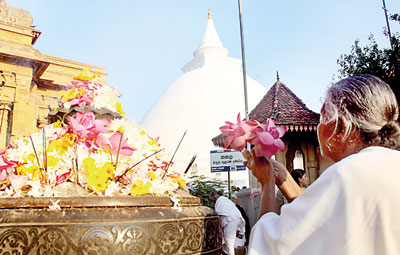Avurudu traditions come but once a year
View(s):Kala Korner by Dee Cee
As you read this, alut avurudda’ would have just dawned at the end of the ‘nonagathe’ – the transitional period between the old and the new year when one is expected to stop all work and either relax or indulge in religious activities. Many use this time to visit the temple, meet the ‘loku hamuduruwo’, offer betel and get his blessings for the new year. They would offer flowers, light the oil lamps, recite the stanza and return home in time to get ready to observe the ‘avurudu charithra’ – the customs at the dawn of a new year.

Many participate in religious activities during the nonagatha period
In the old days, parents would not allow the children to read books or do normal day-to-day activities. They were encouraged to play or relax until the auspicious time for the ‘veda alleema’. It’s the time children as well as adults played indoor games like ‘pancha demeema’ (playing with shells) and ‘daangedeema’ (draughts). (The ‘pancha’ game in ‘Gamperaliya’ remains a memorable scene in everyone’s mind). Outdoor games are played after the ‘avurudu’ customs are completed more as community gatherings rather than family get-togethers.
As the ‘nonagathe’ draws to a close, children along with the elders don their new clothes stitched in the colours specified for the new year. (A mix of red and yellow is this year’s ‘avurudu’ colour). While the mothers used to buy the cloth and stitch them in the years gone by, now the practice is to buy readymade clothes. The children diligently get ready to read and write at the auspicious time while the elders prefer to begin the new year by partaking in an activity related to their day to day work. The male would till the land or cut a branch to symbolise the start of work in a fresh year. (The women in the household would have already lit the hearth at the auspicious time to cook the first meal for the new year.)To set an example to the children and prompt them to get to their books, the father and mother usually read a paragraph or two from a ‘bana potha’ or recite a stanza from the ‘pirith potha’.
The big moment for the children comes during the ‘ganudenu’ time. They would offer betel and worship the parents who will return the betel along with some cash. The younger ones will then worship the elder brother and sisters who in turn will reciprocate with a little ‘santhosam’. The family will then sit together for the first ‘avurudu’ meal when the mother will serve everyone. It is customary for everyone to taste a piece of ‘kiribath’ before proceeding to ‘kavum’, ‘kokis’ and other ‘kevili’.
The married children visit the parents with their children later in the day or the next day depending on how far away they stay. They will bring gifts for the parents and the young ones at home, sit with them and enjoy the ‘avurudu’ meal.
The applying of oil – that falls tomorrow this year – is the next significant ‘avurudu’ event. In most villages the people gather at the temple and the chief monk performs the ceremony using a sheaf of leaves prescribed for the purpose while chanting stanzas blessing each one of them. The oil is prepared in the temple according to the traditional method and those who are unable to come to the temple are given their share in advance. Facing the specified direction, the head of the family would apply the oil on each family member at the auspicious hour.
Although a date and time is given to resume work for the ‘alut avurudda’, this is rarely observed by those who are employed. The village folk, particularly those who cultivate their own crops would still follow the custom with the belief that they will gather more harvest if they start work at the auspicious time.
While ‘avurudu’ customs help to maintain age old traditions and strengthen family bonds, they also play a significant role in promoting community harmony.
Follow @timesonlinelk
comments powered by Disqus















